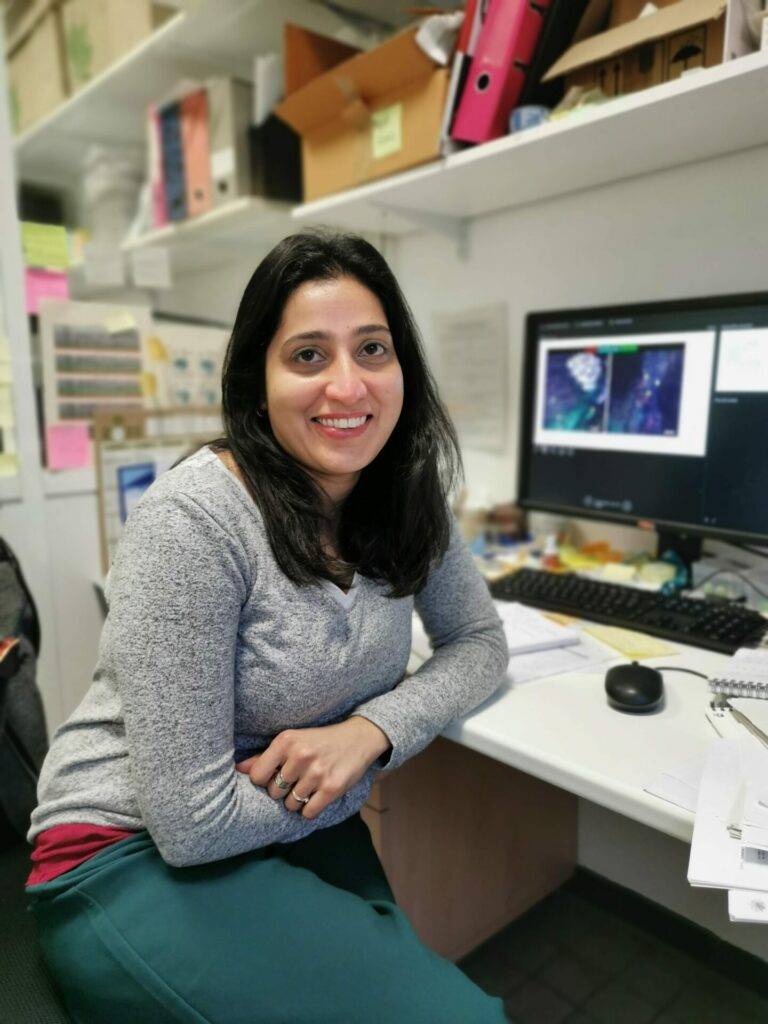Nadine Suffee
UMR 1166 Team 3, Cellular and Molecular Plasticity in Cardiovascular Diseases

Awards / Distinctions
- 2023 Best Poster award, ESC working group CBH&MF, Italy.
- 2023 Alain Castaigne Award, French Society of Cardiology, France.
- 2020 Lefoulon-Delalande Foundation, Post-doctoral fellowship, PARCC France.
- 2012 Best Young Researcher oral award, Société Française de Cardiologie, France.
- 2008 Ministry of Research grant, Faculty of Science and Medicine, Sorbonne Paris Nord, France.
Training
Dr. Nadine Suffee is a researcher with expertise in the mechanisms of development of atrial cardiomyopathy. She specializes in understanding the role of progenitors, the immune response and epicardial adipose tissue remodeling.
She graduated in 2012 with a PhD in cell biology and experimental therapies from the Sorbonne Paris Nord. During her PhD, she carried out work on neovascularization induced by endothelial precursors recruited by chemokines; which she modulated with biodegradable biomaterials. She then completed her first post-doctorate on induced stem cells (iPS) for corneal endothelial regeneration at the University of Saint-Etienne.
All her experience led her to focus on understanding the cellular and molecular mechanisms of atrial fibrillation (AF), the most common cardiac arrhythmia in clinical practice at Sorbonne University, with Prof. S. Hatem. His work has helped define the pathophysiological process of AF as an atrial cardiomyopathy in which immune cells are infiltrated. Her curiosity to understand the role of inflammation led her to join Prof. Z. Mallat’s laboratory at PARCC and the University of Cambridge (UK).
Today, her research at UMRS1166-IHU ICAN focuses on the role of macrophages in the development of atrial cardiomyopathy.
Research project
Atrial cardiomyopathy (ACM) is defined as a pathophysiology leading to rhythm disorders such as atrial fibrillation (AF), one of the main causes of vascular embolic events and heart failure. A-fib is linked to electrical and tissue remodeling of the atrium, and is favored by hypertension, valvulopathy, heart disease and obesity. Metabolic syndromes have a direct impact on cardiac physiology and function, but the mechanisms by which obesity and diabetes lead to the onset of AF are debated.
Recently, epicardial adipose tissue (EAT) has emerged as an important component of MAC. WT dysfunction induces the secretion of soluble mediators, i.e. fibrokines, responsible for the progressive replacement of WT by fibrosis disrupting electrical activity. The mechanisms leading to WT dysfunction are poorly understood. Obesity is associated with peripheral adipose tissue (AT) dysfunction mediated by an inflammatory environment in which macrophages are a major player. The atria of obese patients also show adipofibrous remodeling, suggesting a similar mechanism with the involvement of macrophages induced by pro-inflammatory cytokines.
However, the nature of macrophages, their regulation and their role during the development of AMC are not known. In addition, my work has also shown that factors secreted by the WT reactivate epicardial resident progenitors (EPCs), which are at the origin of the adipocytes that make up the WT and the myofibroblasts responsible for fibrosis. My hypothesis is that the WT secretes cytokines responsible for regulating macrophages, which in response recruit EPCs and activate differentiation pathways, thereby promoting CMA.
My research project aims to understand the relationship between metabolism, the macrophage immuno-inflammatory response and the acquisition of an adipose-fibrous phenotype in the atrial epicardium.
My objectives are :
1/ identify the role of resident atrial macrophages and that of macrophages derived from circulating monocytes
2/ understand functional alterations in atrial macrophages in obesity
3/ demonstrate the impact of the inflammatory environment on EPC recruitment and differentiation.
This research project will map the cellular players involved in the formation of obesity-associated atrial cardiomyopathy, and understand their role in the dialogue between atrial myocardial remodeling and systemic metabolic abnormalities.
“One’s success is not measured by one’s status, but rather by the obstacles one has overcome,” Booker T. Washington.
Publications
- Takaoka M , Zhao X, Lim HY, Magnussen C, Suffee N, Schrank P, Ang O, Tsiantoulas A, Sommer F, Mohanta S, Harrison J, Meng Y, Laurans L, Wu F, Lu Y, Masters L, Newland S, Denti L, Hong M, Chajadine M, Juonala M, Koskinen J, Kähönen M, Kaisho T, Habenicht A, Tedgui A, Ait-Oufella H, Zhao T, Nus M, Ruhrberg C, Taleb S, Williams J, Raitakari O, Angeli V, Mallat Z. Childhood hyperlipidaemia alters resident arterial macrophages and accelerates atherosclerosis (Nature revision).
- Suffee N, Baptista E, Piquereau J, Ponnaiah M, Doisne N, Ichou F, Lhomme M, Pichard C, Galand V, Mougenot N, Dilanian G, Lucats L, Balse E, Mericskay M, Le Goff W, Hatem SN. Impacts of a high-fat diet on the metabolic profile and the phenotype of atrial myocardium in mice. Cardiovasc Res. 2022 PMID: 34971360.
- Suffee N, Moore-Morris T, Jagla B, Mougenot N, Dilanian G, Berthet M, Proukhnitzky J, Le Prince P, Tregouet DA, Pucéat M, Hatem SN. Reactivation of the Epicardium at the Origin of Myocardial Fibro-Fatty Infiltration During the Atrial Cardiomyopathy. Circ Res. 2020 PMID: 32175811.
- Suffee N, Moore-Morris T, Farahmand P, Rücker-Martin C, Dilanian G, Fradet M, Sawaki D, Derumeaux G, LePrince P, Clément K, Dugail I, Puceat M, Hatem SN. Atrial natriuretic peptide regulates adipose tissue accumulation in adult atria. Proc Natl Acad Sci U S A. 2017 PMID: 28096344
- Haemers P, Hamdi H, Guedj K, Suffee N, Farahmand P, Popovic N, Claus P, LePrince P, Nicoletti A, Jalife J, Wolke C, Lendeckel U, Jaïs P, Willems R, Hatem SN. Atrial fibrillation is associated with the fibrotic remodelling of adipose tissue in the subepicardium of human and sheep atria. Eur Heart J. 2017 PMID: 26612579.
- Suffee N, Hlawaty H, Meddahi-Pelle A, Maillard L, Louedec L, Haddad O, Martin L, Laguillier C, Richard B, Oudar O, Letourneur D, Charnaux N, Sutton A. RANTES/CCL5-induced pro-angiogenic effects depend on CCR1, CCR5 and glycosaminoglycans. Angiogenesis. 2012 PMID: 22752444







